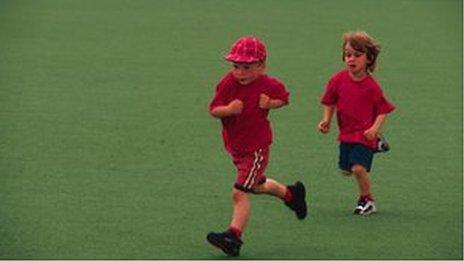Olympics legacy: How can we encourage kids into sport?
- Published
- comments
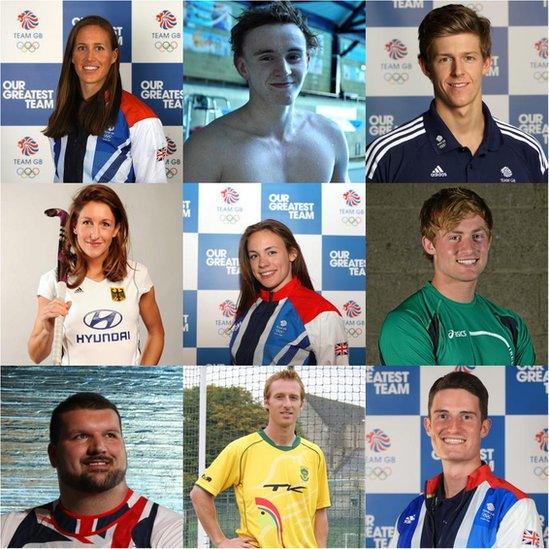
Millfield School has nine current and former pupils competing at the London 2012 Olympics, including Helen Glover, top left, who won rowing gold, and Peter Wilson, bottom right, who took top honours in the shooting
With Team GB celebrating their most successful Olympics for 100 years, a debate is growing about how best to build on the legacy and inspire the next generation into sport.
The message from David Cameron was clear - there needs to be "a big cultural change" towards sport in schools with a return to the "competitive ethos" in school sports.
The prime minister said the problem was not money and suggested some teachers were not "playing their part" but what do those in grassroots sport believe are the key ingredients for success?
Opportunity
Graeme Maw, director of sport at Millfield School, in Somerset, says every pupil at the school does a minimum of three hours of scheduled sport per week.
However, many pupils at the private school, which has nine former and current pupils competing at the London Games - more than any other school - do up to 22 hours of training. There are also more than 30 different sports on offer.
Mr Maw says the word "opportunity" is key.
"Sport and physical activity are the heartbeat of our community," says Mr Maw.
The Youth Sport Trust (YST) says it is important schools engage everyone, for example by involving young people in the selection and planning of sport and activities.
Schools also need to broaden the range of lunchtime and after-hours clubs to increase opportunities for young people to take part, it says.
It is an ethos Mr Maw agrees with. "Dance might not be an Olympic sport but it's something that young girls really enjoy - it's about finding and discovering individual talent in a child," he adds.
Expertise
Mr Cameron spoke on Wednesday of "some teachers not wanting to join in and play their part" when it came to school sports.
But Malcolm Trobe, deputy general secretary of the Association of School and College Leaders (ASCL), says his comments were "ill informed, unfair and fail to recognise the huge contribution that many teachers make to sports in schools".
"Many teachers, not just PE staff, willingly give up their time to motivate and coach young people in a wide range of sports," he says.
The YST says there must be teachers and coaches on the ground ready to support young people who show an interest in sport at primary and secondary level.
Investment
Mr Cameron has said the government is investing £1bn in school sports over the next four years, but "the problem isn't money".
David Mansfield, headteacher at Coopers' Company and Coborn School, in Essex, says investment is key. The state school was named the most sports-minded school in Europe in 2005 and Mr Mansfield says it is one of few that competes with public schools in national sport.
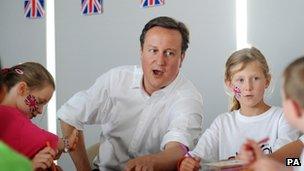
David Cameron has said the 2012 London Olympics will bring "a massive legacy" to Britain
Mr Mansfield says the school's success is down to putting extra money into sports, for example, the school employs a professional hockey coach. He describes funding as "the bottom line" and says there is a "straight-line correlation between outcomes and incomes".
"If schools are not on the front foot to identify talent then we're going to see a real fall away from the fantastic job that has been done (in the past)," he says.
Mr Trobe is critical of the removal of funding for the Schools Sports Partnership (SSP), a network of sports colleges in England - including the Coopers' school - that put specialist PE teachers to work with primary school pupils, linked schools with local sports clubs, brought high quality coaches into schools and promoted competitive matches.
Experts say it is too early to say how this will affect school sport participation.
But Mr Trobe says: "If the prime minister is serious about wanting to enhance sport in schools the funding will need to be put in place to support those very willing teachers and coaches to deliver a lasting sporting legacy."
Playing fields and facilities
The Fields in Trust (FIT), a UK charity that protects recreational spaces, says funding is essential - but it is important not to forget about the fields themselves.
"It is important to look beyond the funding when considering sporting legacy for a golden future," said Alison Moore-Gwyn, chief executive.
Archive: Le Clos' father overcome with pride
"David Cameron has initiated this process but it is vital that other elements which nurture sporting ability are not overlooked. A fundamental one is the provision of space for people to discover and hone their talent."
The charity's Queen Elizabeth II Fields Challenge focuses on this, says Ms Moore-Gwyn. The scheme works with landowners to protect their outdoor recreational spaces, aiming for 2,012 of them by the end of this year.
The YTS says school and council facilities should also be opened up after hours.
On Tuesday, it was revealed that Education Secretary Michael Gove has approved the sale of more than 20 school sports fields in the past two years.
But FIT said more concerning was the situation for academies and new free schools, which are exempt from government regulations that govern mainstream schools' freedom to sell off their playing fields. There could be an unknown number of other sports pitches that have been lost, it said.
"This could have serious implications for our sporting legacy," a spokeswoman said.
Competitive spirit
The prime minister has called for a return to the "competitive ethos" and "getting rid of the idea all must win prizes and you can't have competitive sports days".
But British Olympic Association chairman Colin Moynihan says many children do not want to play competitive sport, nor should they have to.
"The key thing is to make sure that where they do want to there's the facility and the opportunity for them to do so and that's our emphasis and has been our emphasis throughout," he says.
The YST adds that the first experience young people have of sport needs to be as positive as possible to encourage them to go further.
Role models
This week a survey of 2,000 people by Freeview found that seven out of 10 thought Team GB athletes had replaced music stars and footballers as role models.
During the Games so far many stars have served to inspire young athletes.
Alan Davis, head coach at the Maindy Flyers club in Cardiff, where gold medal-winning cyclist Geraint Thomas trained until he was 16, said Thomas was "the perfect role model".
"He's humble and takes his success and occasional setbacks equally well. What better example to give nine-year-old kids," he said.
While Jessica Ennis's former PE teacher has said she is inspiring a new generation of athletes.
Chris Eccles, who taught Miss Ennis at King Ecgbert School, Sheffield, said: "They are inspired by her because they can see someone from their own town being so successful."
Committed parents
They have been on show throughout the Games, none more so than Chad Le Clos's father Bert who paid tribute to his "beautiful boy" after winning a swimming gold, but parents are often key to many Olympic successes.
John Steele, chief executive officer at the YST, says: "For every gold medal and Olympic athlete we have had the pleasure to watch performing at the Games, there is a teacher, coach or parent that inspired them to start the journey to be their personal best."
The YST says parents should encourage their children to lead active lifestyles and get them involved in sport, but parents themselves also need to be encouraged into volunteering roles in sports clubs and school sports activity.
Fun
Mr Maw says it is important to find ways to celebrate sport and make it fun.
Last year 2,000 of Millfield's pupils and 450 members of staff ran a total of 2,755 miles, raising £21,000 for Sport Relief.
He says it is about "everybody having fun in the name of sport".
- Published8 August 2012
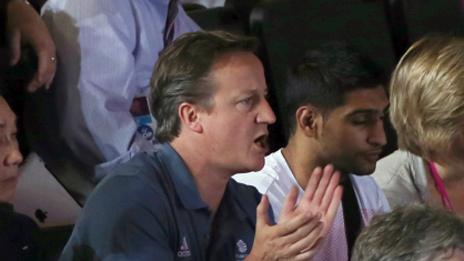
- Published9 January 2012
- Published3 August 2012
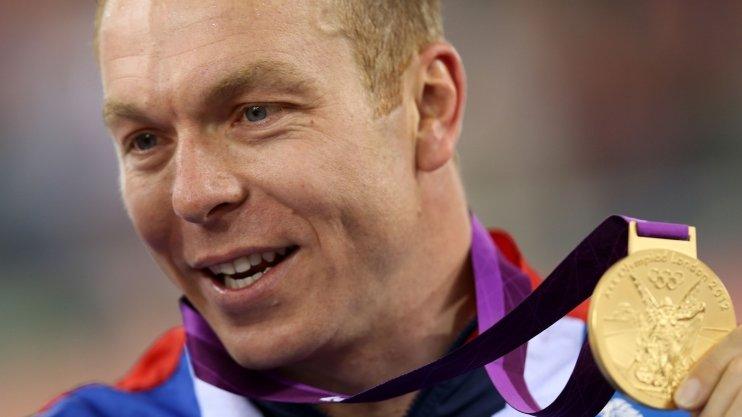
- Published9 January 2012
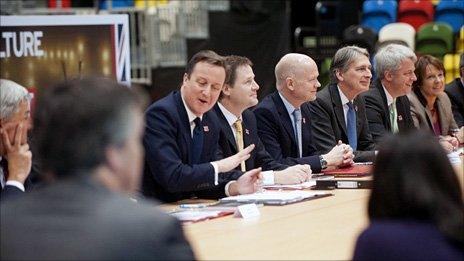
- Published21 November 2011
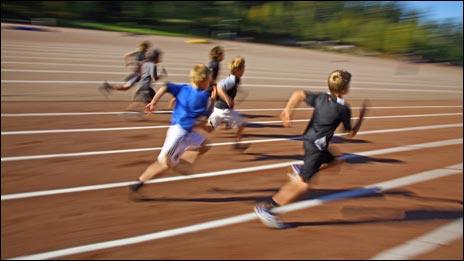
- Published21 November 2011
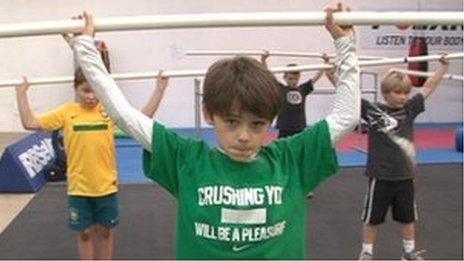
- Published7 August 2012
